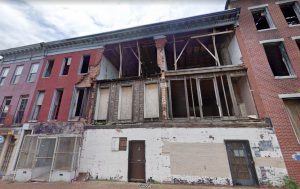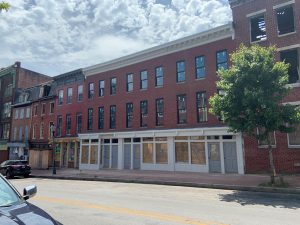A New Canvas for Baltimore: Change Is Brewing with an Ethiopian Cafe Planned for West Baltimore Street
A New Canvas for Baltimore: Change Is Brewing with an Ethiopian Café Planned for West Baltimore Street
Three formerly derelict properties in Baltimore have been renovated to create space for an Ethiopian café. The renovation is the latest milestone in the ongoing revitalization of West Baltimore Street. The efforts were led by the Southwest Partnership, a coalition of community leaders from seven neighborhoods in the city’s southwestern district and supported by Governor Larry Hogan’s signature initiative for the redevelopment of Baltimore City, Project C.O.R.E. or Creating Opportunities for Renewal and Enterprise.
In 2017, the owners of Washington, D.C. restaurant Ethiopic looked to duplicate their success in a new city. After spending time with friends in the Union Square neighborhood, the husband and wife team purchased the properties in the 1500 block of West Baltimore Street for mixed use as an Ethiopian restaurant and apartments. While the area features many well-maintained historic properties, these buildings were missing large portions of their facades and seemed destined for demolition until the new owners started working with the Southwest Partnership.
Founded in 2012, the Southwest Partnership is a coalition of community leaders and stakeholders from the seven southwestern Baltimore neighborhoods of Barre, Franklin Square, Hollins Roundhouse, Mount Clare, Pigtown, Poppleton, and Union Square. After extensive community input, the organization implemented a master vision plan for the revitalization of these neighborhoods, including redevelopment of the West Baltimore Street corridor. The state has supported the Southwest Partnership’s efforts, awarding Project C.O.R.E. funds for demolition or stabilization and rehabilitation of properties on West Baltimore Street. With those Project C.O.R.E. funds, the partnership provided a grant award for façade renovation to the new owners to assist with rehabilitation of the properties.
The rehabilitation began in May, and, while there have been delays due to the COVID-19 pandemic, the progress is already apparent. Led by project contractors Art Construction & Restoration, a local minority-owned business conveniently headquartered on West Baltimore Street, the missing facades have been replaced and renovated to reflect the historic character of the neighborhood. The owners plan to open as a café and coffee shop with plans to grow to a full-service Ethiopian restaurant like Ethiopic. There is potential for additional street-level retail space, and the upper level will feature six apartments.
The new café is the latest milestone in the Southwest Partnership’s successful revitalization efforts. Project C.O.R.E. and state programs like the Baltimore Regional Neighborhood Initiative have assisted with acquisition of the historic Lord Baltimore Theater, a former candy factory slated for reuse as apartments, and preservation of a wood-frame home built by carpenter and African-American freeman Malachi Mills in the 1840s.
Since its launch through Fiscal Year 2019, Project C.O.R.E. has demolished, rehabilitated, or stabilized more than 4,100 units. Through the initiative and supporting revitalization and housing programs, the State of Maryland has invested nearly $472 million in Baltimore City, leveraging more than $1.9 billion in other private, public and philanthropic dollars.
# # #


